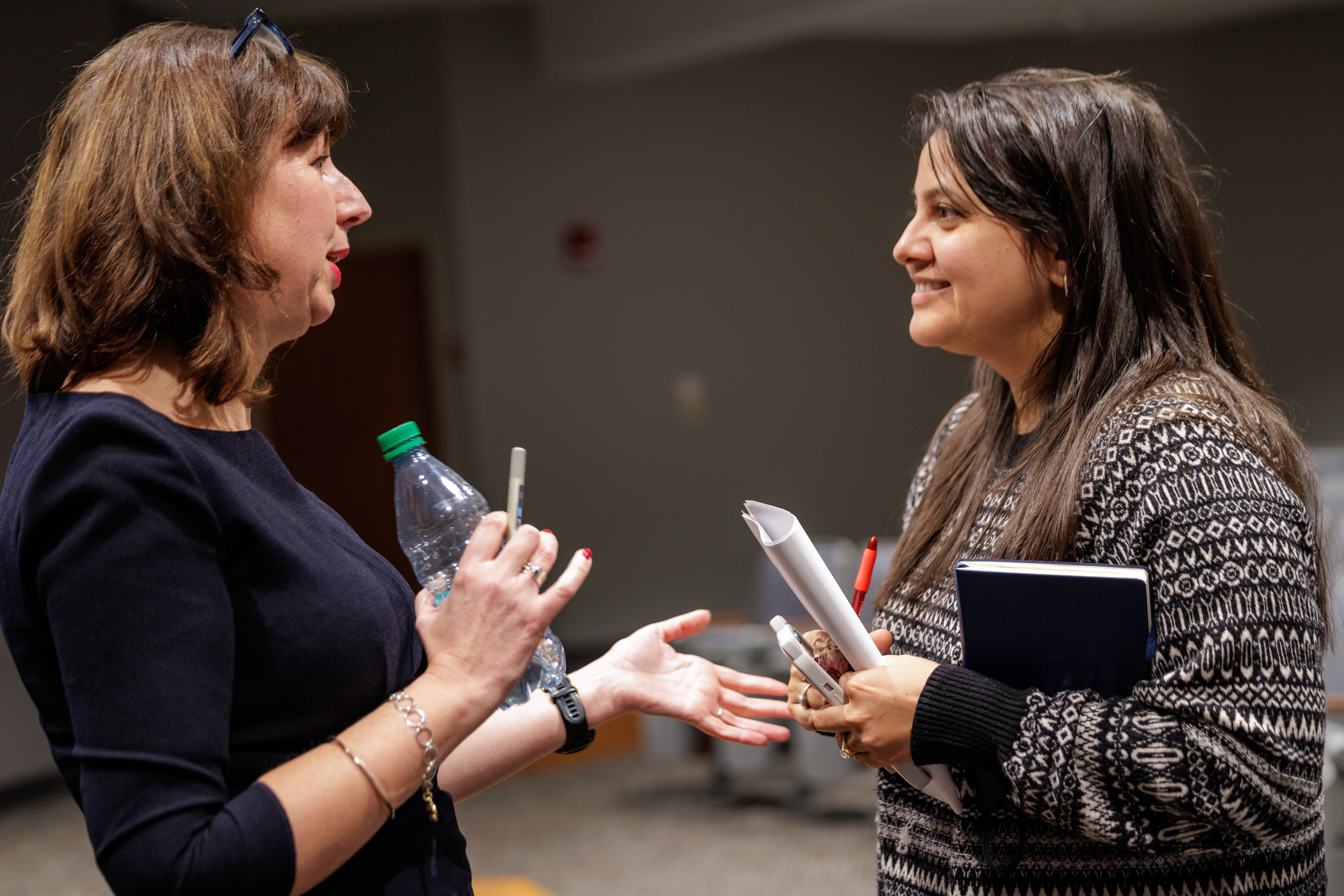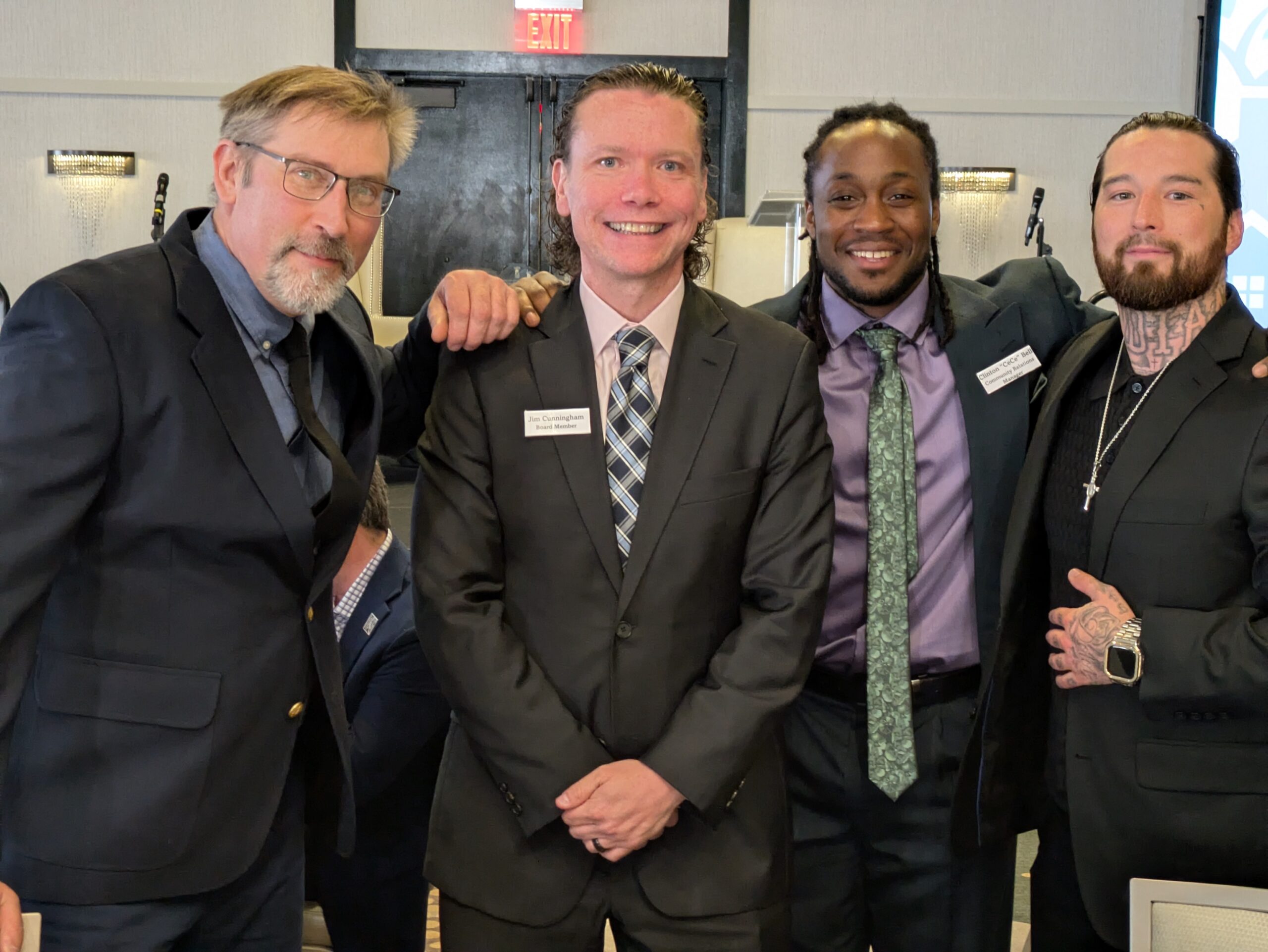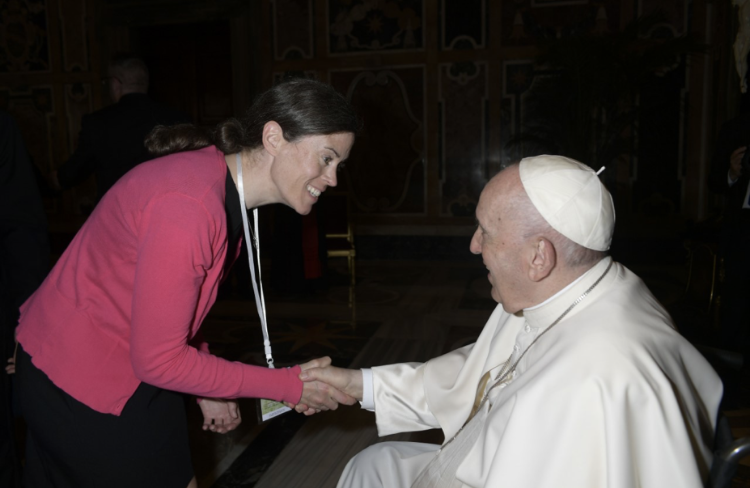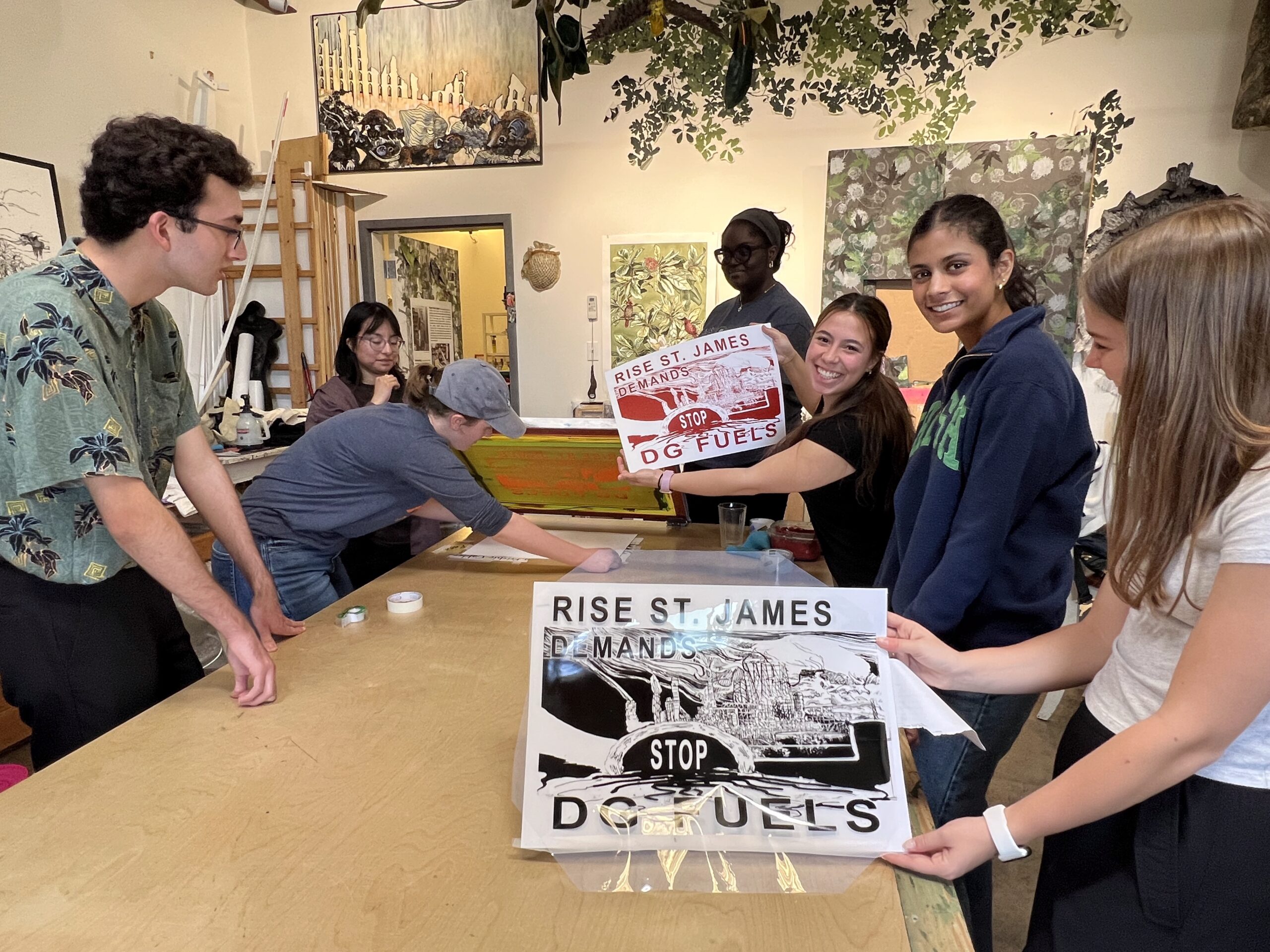Toward a culture of encounter
Lecture series engages Pope Francis, Catholic social tradition
May 14, 2025
“Faith is an encounter with Jesus, and we must do what Jesus does: encounter others.”
So stated Pope Francis in a Pentecost vigil from Saint Peter’s Square during the first months of his papacy in 2013. In contrast to contemporary society’s “culture of conflict,” Pope Francis exhorted his listeners to create a “culture of encounter,” which he described as “a culture of friendship, a culture in which we find brothers and sisters, in which we can also speak with those who think differently, as well as those who hold other beliefs, who do not have the same faith.”
Throughout his papacy, Pope Francis continued to exhort Christians—and all people of goodwill—to work toward this culture of encounter. In his 2020 encyclical Fratelli tutti, he described dialogue as the essential ingredient to a culture of encounter. “If we want to encounter and help one another, we have to dialogue,” he wrote. “Unlike disagreement and conflict, persistent and courageous dialogue does not make headlines, but quietly helps the world to live much better than we imagine.”
Inspired by the pope’s exhortation to encounter and dialogue, the Institute for Social Concerns launched the series Encounter: Conversations on Catholic Social Tradition. Organized by Suzanne Mulligan, professor of the practice and co-director of the Catholic social tradition minor, the series features distinguished scholars of Catholic social tradition who share insights and guide critical conversation on matters of justice and the common good in our fragmented time.
“We’re hearing so much in public discourse right now on what’s dividing us and what it is that differentiates us from each other,” Mulligan stated. “And instead of being seen as a gift, sometimes we think of difference as a threat. But we know that it’s through true genuine human encounter that we come to see the dignity of people, and we can break through the limiting stereotypes and caricatures that we often construct for ourselves and for others.”
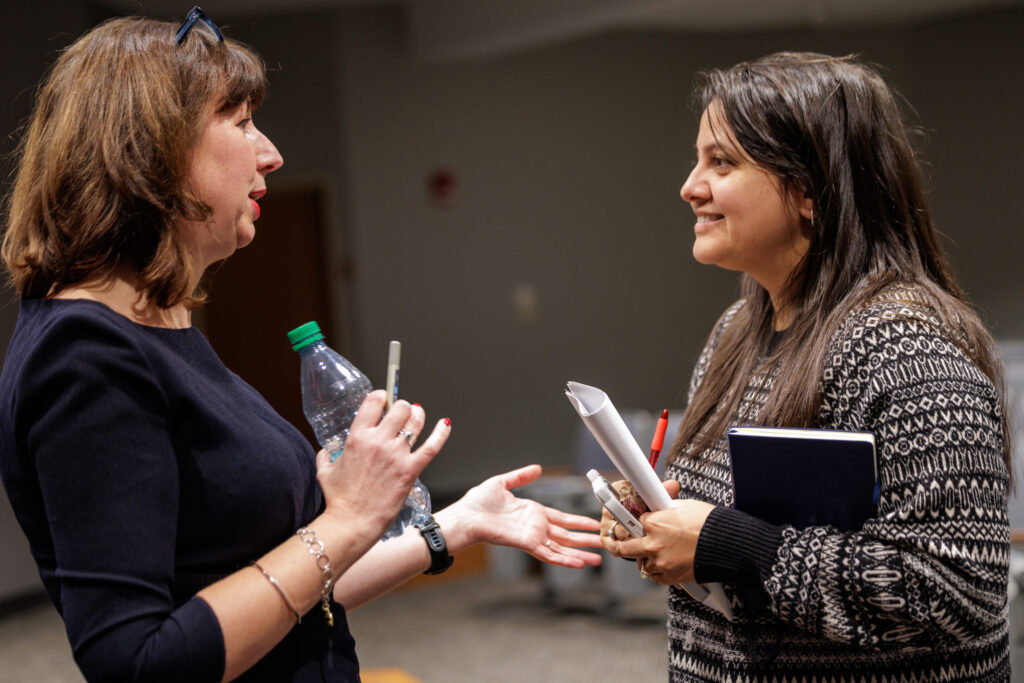
Anna Rowlands, the St. Hilda Chair in Catholic Social Thought and Practice at Durham University, England, and author of Towards a Politics of Communion: Catholic Social Teaching in Dark Times, kicked off the series by recounting the life and writings of twentieth-century French philosopher, activist, and mystic Simone Weil and her unexpected relevance to the themes of Pope Francis’s social teaching on political community.
As a refugee in Europe and later the United States during World War II, Weil wrote on the concept of “rootedness” as “the most significant yet difficult to define and often overlooked spiritual need of the human person,” Rowlands explained. In her 1943 work The Need for Roots, Weil contrasts rootedness with “uprootedness,” which she describes as the severing of ties to one’s history and community.
In her talk, Rowlands drew parallels between Weil’s text and Pope Francis’s Fratelli tutti, published nearly 80 years later. There Francis writes that “there is no worse form of alienation than to feel uprooted, belonging to no one.” In a time of increasing isolationism and xenophobia, Rowlands highlighted Pope Francis’s counter-cultural emphasis on care for migrants, arguing that “the politics of rootedness is fast becoming a defining political drama of our age.”
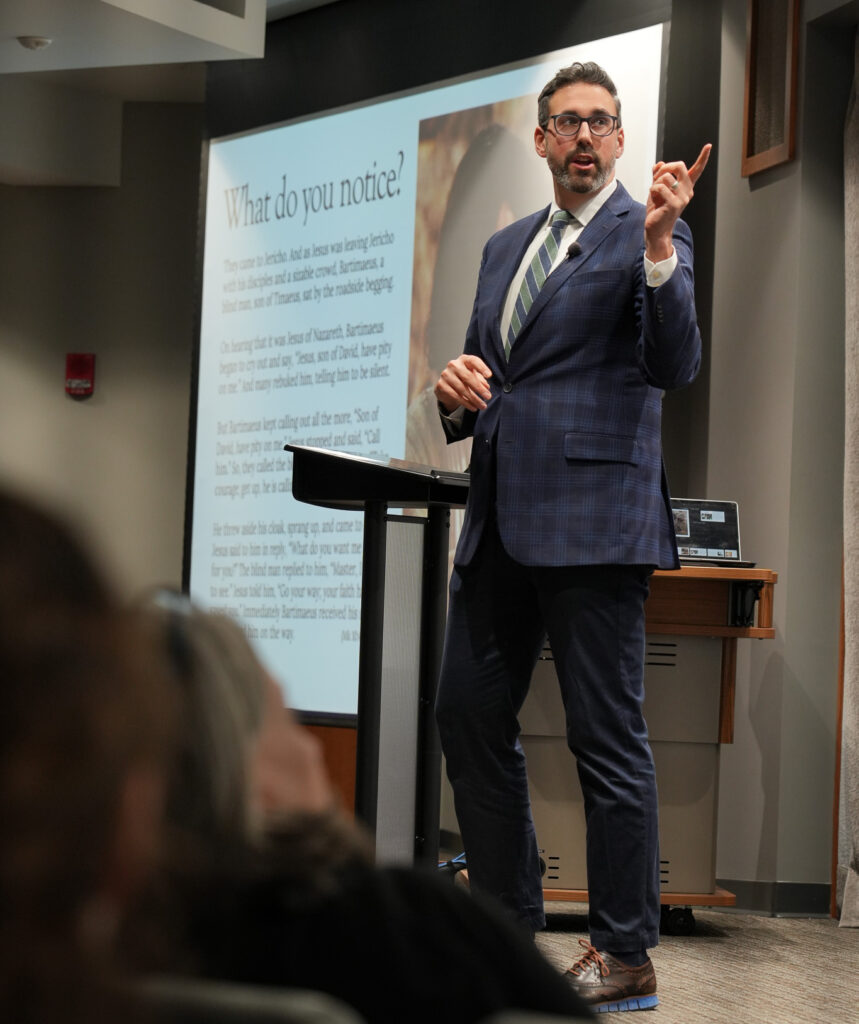
Following her talk, Rowlands reflected on the significance of exemplars like Weil and Pope Francis for the work of the institute. “We have a right to illumination, and that illumination comes in the form of lives well lived,” she said. “The way in which education contributes towards the possibility of being people who illuminate our times is really, really significant. This is a site which is generating hope.”
Marcus Mescher, associate professor of Christian ethics at Xavier University, drew from his book The Ethics of Encounter: Christian Neighbor Love as a Practice of Solidarity to engage stories of encounters in the Gospels and Mescher’s own life in order to invite students to practice what Pope Francis called “the art of encounter.”
“Ultimately, experiences are less about what we do for people than about being with and being changed through those encounters,” Mescher stated. “Encounter is the floor and not the ceiling. It’s just the entryway into where we need to go, which is relationships marked by mutual respect, genuine concern, and a robust spirit of co-responsibility.”
According to Mescher, “the end goal, the vision, is friendship. It’s not feeling sorry for people. It’s not just merely tolerating differences. It’s trying to create the conditions for courage, compassion, generosity, humility, and the fidelity to remember that at the end of the day we belong to each other as equal members of God’s family.”
“Encounter is the floor and not the ceiling.”
Victor Carmona, associate professor of theology and religious studies at the University of San Diego, described his own life-changing encounter with Maria, whom Carmona met in South Bend during his graduate studies at Notre Dame. “Just the experience of meeting Maria and seeing how she navigated the challenges of being a single mom, while also being an undocumented immigrant here in South Bend, shook me to my core, and it grounded me as a theologian.” After meeting Maria, Carmona wrote his theology dissertation on a critique of US immigration policy. He ultimately dedicated his dissertation to Maria and named his daughter after her.
In his talk, Carmona expounded on his theological critique of US immigration policy, drawing insights from Catholic social tradition and the writings of Pope Francis. According to Catholic social tradition, he explained, migrants have a “right to residency,” which requires host countries “to welcome, to protect, to promote, and to integrate.”
“Integration, which is neither assimilation nor incorporation, is a two-way process, rooted essentially in the joint recognition of the other’s cultural richness,” the pope stated to those gathered at the 2017 International Forum on Migration and Peace. Carmona argued that “Francis, on the basis of Catholic social teaching, is actually quite demanding, as he should be.”
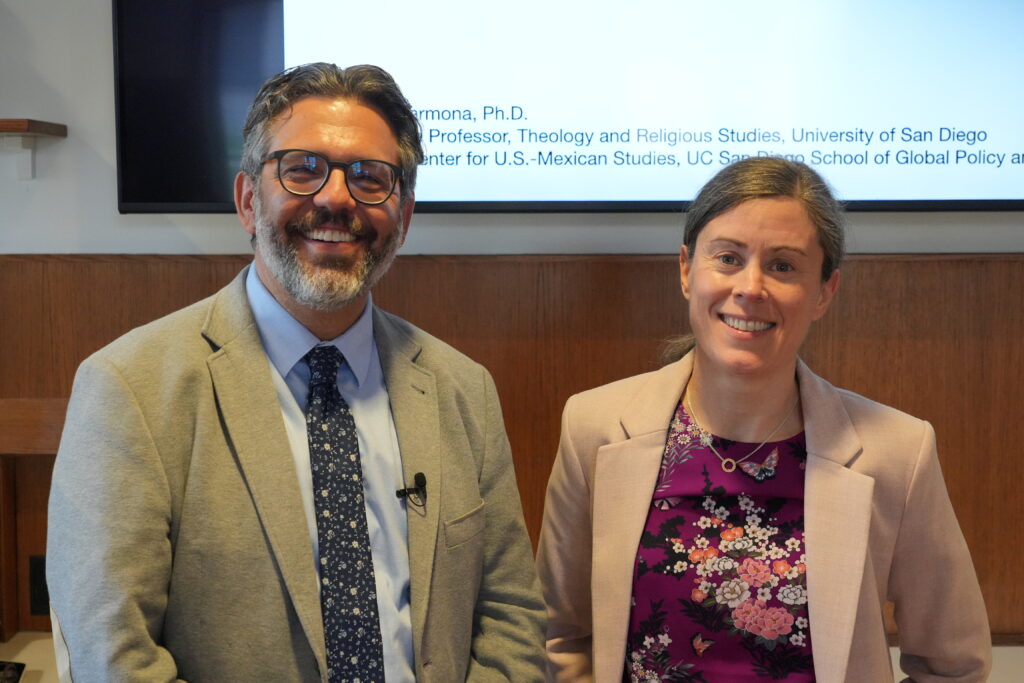
Recalling a statement by Cardinal Baggio that “migrants are a sacrament of God’s presence among us,” Carmona reflected, “This is why encounter is so important—because ultimately when I encounter the migrant as I did with Maria and with many others, I’ve encountered Christ in them, and I’ve been transformed for the good.”
“This is why I think the work of places like this institute is absolutely essential for Catholic higher education,” Carmona said during his visit. “There’s only so much encountering you can do inside the classroom. There’s only so much encountering that you can do that engages not just the mind but the heart, and I think this is where encountering matters deeply.”
“We are indebted to our Encounter speakers for their critical interventions throughout the semester,” Mulligan shared. “At a time when higher education has been put on the defensive, our speakers refocused us on what is at the heart of Catholic social teaching and all that we do at the institute. From our CST Conference to our CST minor, we aim to create a ‘culture of encounter’ with those different from ourselves so that, through those encounters, we might encounter the source of all goodness, beauty, and truth.”
View the Encounter lectures in their entirety on the Institute for Social Concerns’ YouTube page.
Read Anna Rowlands’s published version of her talk at ABC Religion and Ethics.
Related Stories
-
Toward a culture of encounter—Lecture series engages Pope Francis, Catholic social tradition
-
“Windows of hope”—NDPEP’s reentry work pursues holistic thriving for returning citizens
-
ReSearching for the Common Good: Yunyan Zhao
-
Remembering Pope Francis—Institute faculty reflect on the pope’s influence on their work
-
Pursuing justice by getting proximate—Students explore themes of proximity, natality, and rootedness in spring break seminars

